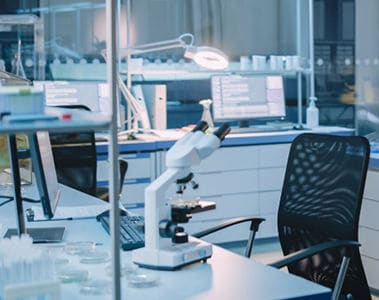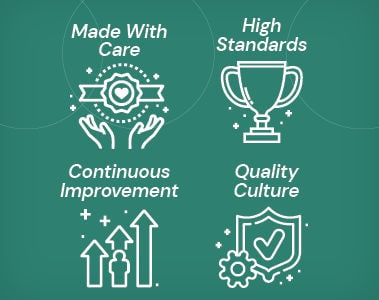DHAgold™
With DHAgold™ we bring you a sustainable source of DHA to enrich animals.
In recent years, attention has been focused on addressing the global challenges of hunger, malnutrition and impaired health in our population. Since 2014, aquaculture has provided more fish for human consumption than capture fisheries, and by 2030 it is expected to contribute 60% of the total fish and shrimp available for human consumption. Expanding the role of aquaculture towards ending hunger and all forms of malnutrition is as important as the focus on increasing production. Aquaculture is uniquely positioned to be one of the driving forces needed to address the nutrition challenges that we face in the world today.
The need to provide enough animal protein for a growing population, while reducing the environmental costs of farming will require smart science and innovative solutions. This will make it possible to grow aquaculture in a sustainable way. dsm-firmenich cares about making this aquaculture growth sustainable and is addressing this challenge with its strategic initiative: We Make It Possible.













With the need for an expanding raw material basket in aquaculture, and the increased use of plant raw materials, feed enzymes are a key technology that enable higher efficiency of use. By complementing the animals' own digestive enzymes, feed enzymes, ensure more of the diet is digested, and their use delivers greater flexibility in feed formulation. Follow this link to see how DSM enzymes can solve this challenge.
Over 50% of fish and shrimp for human consumption comes from aquaculture and consumer demand for sustainable seafood has grown rapidly in the last years. One of the challenges facing the industry is reducing our reliance on marine derived EPA & DHA omega 3 fatty acids. Veramaris® is the first ASC-MSC certified natural marine algae oil with the highest levels of EPA & DHA omega 3- fatty acids. This breakthrough innovation can help the industry grow within planetary boundaries. Learn how Veramaris® and its breakthrough innovation can solve this challenge.
It is well documented that compound feed, used in about 70% of global aquaculture, is the largest contributor to the environmental footprint. When assessing how animal production can sustainably meet future protein demand, a full life cycle assesment that covers all 19 environmental metrics should be conducted for different aquaculture production systems. Read here how DSM innovative solutions can enable the profitable growth of aquaculture within planetary boundaries.
Vitamins and omega-3 are essential for the life, health and well-being of animals. Our Optimal Vitamin NutritionTM Platform (OVNTM) and Veramaris® Optimum Omega Nutrition Platform provide high quality vitamins and essential fatty acids omega-3 for the life stage and growing conditions of aquaculture species. Read here how DSM innovative solutions can improve lifetime performance. By 2025, The World Health Organization (WHO) expects that half of the world’s population will be living in water-stressed areas and current aquaculture inland production represents more than 50% of world total production. Read here how DSM innovative solutions in feed enzyme technology can reduce phosphorus and nitrogen emissions.
More than 1 billion tons of food is lost and wasted each year. Several essential vitamins and minerals, such as vitamin C and E, and omega-3 are key micro-nutrients which can significantly extend the shelf life, quality and improve nutritional value of fish and shrimp products. Color is also a key attribute for the final product and important to consumers. Achieving the correct pigmentation in salmonids, shrimp and other marine species contributes in minimizing downgrades along the value chain and meeting customer demands. Read here how DSM innovative solutions can reduce food loss and waste and improve product quality.
The risk of Antimicrobial Resistance (AMR) to human and environmental health puts increasing pressure on animal protein industries to reduce antibiotic use. If no action is taken, by 2050 AMR could cause 10 million deaths each year. Farm management, biosecurity, genetics, vaccines, new technologies, functional feeds have all been pivotal in achieving aquaculture growth the last years. DSM innovative solutions support optimum nutrition, improve gut health and enhance immunity, enabling the aquaculture industry to significantly reduce the use of antibiotics across species and geographies. Read here how DSM innovative solutions can tackle AMR.
In dsm-firmenich we want to play a key role in driving the sustainable growth of aquaculture and work across the industry (different species and countries) with our partners to provide tangible solutions to make this happen.
The amount of fresh water on earth is limited, and its quality is under constant pressure. Current aquaculture inland production represents more than 50% of world total production dominated by carp, tilapia, catfish and shrimp. We provide innovative solutions for optimum water quality, to reduce phosphorus and nitrogen environmental footprint, improve water quality for enabling sustainable animal production.
Supporting:
Expanding the role of aquaculture towards ending hunger and all forms of malnutrition is as important as the focus on increasing production. We provide innovative solutions to deliver fish and shrimp with superior product quality, extended shelf life, consistent colour and optimal nutritional values to the consumer.
Supporting:
Health of farmed fish and shrimp is essential to guarantee sustainable and profitable growth of the aquaculture industry and safeguard final consumers. By ensuring optimum nutrition and optimal gut health, we can improve lifetime performances and reduce antimicrobial use.
Supporting:
With DHAgold™ we bring you a sustainable source of DHA to enrich animals.
dsm-firmenich delivers high-quality vitamin C through ROVIMIX® STAY-C®35.

At dsm-firmenich Animal Nutrition & Health (ANH), we take pride in our rigorous Supplier Quality Management (SQM) approval process, which is pivotal to maintaining the highest standards in our supply chain. This comprehensive process ensures that every ingredient and product meets our high quality standards, supporting our commitment to delivering the best to our customers.

The vitamin market is currently navigating through a period of dynamic changes and opportunities. Recent supply disruptions, maintenance shutdowns, and evolving global market conditions are influencing price movements across various vitamins. From Vitamin E to Vitamin B12 and D, producers and buyers are responding to a landscape marked by reduced supply, increased costs, and shifting demand. This environment not only highlights the resilience and adaptability of the market but also presents unique prospects for strategic purchasing and planning.

A premix is a blend of micro ingredients mixed into a carrier substance. Premixes are the smallest addition to the feed with some of the largest nutritional implications. The aim of a good premix is to evenly distribute micro ingredients and improve absorption. Selecting a good carrier for the micro-ingredients can provide ideal characteristics for flowability and homogeneity. Additionally, using appropriate and stable forms of vitamins and minerals is important to ensure maximum bioavailability for the intended animal species.

In the animal food industry, it is vital to have strong Food Safety and Good Manufacturing Practice (GMP) systems implemented. One key element of a robust Food Safety System is establishing effective programs to prevent foreign material contamination within the premix manufacturing process. dsm-firmenich premix blending facilities utilize a number of technologies to protect the integrity and safety of our animal food products, as well as to protect consumers from the potential threat of foreign contamination.